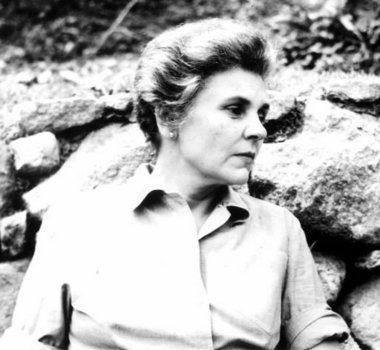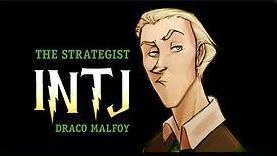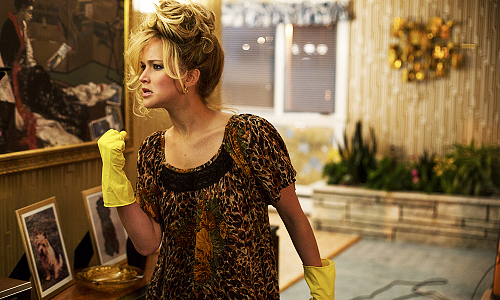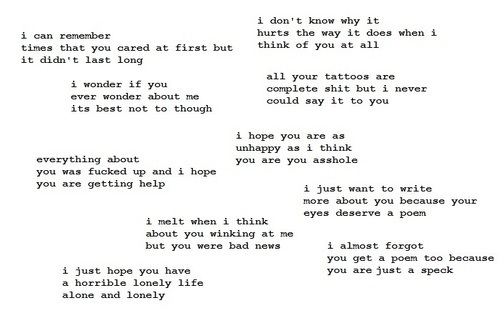Adam Hutchinson's Blog, page 2
January 18, 2014
spagka:
haikus for boys i’ve dated
I love the tattoo one.
January 15, 2014
Can I touch your book?
Speaking of weird characters, my boss has a weird habit of asking if she can touch whatever book I’m reading.
"Can I touch your book?"
She’s said that to me half a dozen times already. I don’t think she means it the way it sounds, but still…
II mean, would YOU let someone touch YOUR book?
January 10, 2014
Writers' Feuds
Hemingway on Faulkner: Poor Faulkner. Does he really think big emotions come from big words?
Carson McCullers: I have more to say than Hemingway, and God knows, I say it better than Faulkner.
Someday I want to be famous enough to have my own feud with another writer.
January 9, 2014
The Man-Moth
“Each night he must
be carried through artificial tunnels and dream recurrent dreams.
Just as the ties recur beneath his train, these underlie
his rushing brain. He does not dare look out the window,
for the third rail, the unbroken draught of poison,
runs there beside him. He regards it as a disease
he has inherited the susceptibility to. He has to keep
his hands in his pockets, as others must wear mufflers.”
(from “The Man-Moth” by Elizabeth Bishop)

I have read bits of Elizabeth Bishop poetry before, but today I discovered her surrealist poem “The Man-Moth” for the first time. The poem tells of an almost-human man who lives underground and only occasionally comes to the surface—in the night, of course—and climbs the buildings in an attempt to reach the moon, which he assumes is a hole in the sky. He is fearful and timid of all around him, and though he fails to understand the world, he is also captured by an intense curiosity.
The poem is, more or less, an affirmation of imagination and the pure emotion that accompanies the solitude of an artist’s life. However, the man-moth also has an obsession. In the stanza quoted above, he is constantly tempted to touch the third rail of the subway, the electrical current that, upon touching, kills immediately. He even must “keep/ his hands in his pockets” to keep from touching it.
At what point does an individualistic curiosity flirt with death? Is this dark tendency a prerequisite for art (or at least, great art)? With how many great poets, writers, and artists become obsessed with death—even suicidal—I’m inclined to think it might be so. In fact, I don’t know how one can truly express a curiosity for the world without an intense curiosity of mortality.
Sure enough, the man-moth is a tortured soul, but his tears are “cool as from underground springs and pure enough to drink cool as from underground springs and pure enough to drink.”
January 8, 2014
A call to writers:
There aren’t enough characters in literature who have a true appreciation of cheese. Let’s fix that.
January 4, 2014
I'm Draco Malfoy and That's Okay

My friend and I had a debate last night about whether or not Draco Malfoy, from the Harry Potter series, is an INTJ. For those of you who don’t know, INTJ is a Myers-Briggs personality type, standing for Introversion, Intuition, Thinking, and Judgment. From the Wikipedia definition, “Hallmarks of the INTJ include independence of thought and a desire for efficiency. They work best when given autonomy and creative freedom. INTJs develop a strong confidence in their ability and talents, making them natural leaders. By nature INTJs can be demanding in their expectations, and approach relationships in a rational manner. At times, INTJs seem cold, reserved, and unresponsive, while in fact they are almost hypersensitive to signals of rejection from those they care for.”
Draco Malfoy is often labeled as an INTJ in character evaluations, and the conversation veered onto this topic because I am, myself, an INTJ. I proudly embrace my association with Malfoy (he is, believe it or not, my favorite character from the series—perhaps a topic for a later post), and I completely agree with his Myers-Briggs type.
The crux of my friend’s argument was that Malfoy was really an INFJ or even an INFP due to his unquestioning loyalty and voluntary submission to Voldemort. INTJs are often skeptical of others’ plans and do not have much respect for authority. However, it’s precisely for that reason that I believe Malfoy really is an INTJ. The turning point for Malfoy is when he fails to kill Dumbledore on the astronomy tower. His loyalty is not to Voldemort as much as it is to the superiority of the magical race, to an abstract ideal, and Dumbledore, despite his opposing ideas and mixed blood heritage, is no doubt a great wizard, a great wizard who even teaches other great wizards, continuing the legacy of magic. Even Draco Malfoy must respect that. To kill him would not be part of Malfoy’s “plan” for magical supremacy. Furthermore, when Voldemort dies, Malfoy and his parents flee instead of standing with their fellow Death Eaters. Fleeing is the cowardly choice, yes, but more importantly, Malfoy lives to send his own children to Hogwarts someday, not in shame but pride, in the hope of continuing the magical legacy.
As for me, I will try very hard not to join a dark cult or destroy the world or use a vanishing cabinet for evil, but I do think, as an INTJ, I can learn a thing or two from Malfoy. In fact, I think we can all learn from him. Namely, sometimes we’re going to think we’re right for a very long time, then suddenly realize we’re wrong. Just like Draco’s mother Narcissa when she protected Harry in the forest, it’s okay to change sides. It’s more important to see the end goal than preserve our plan of how to get there.
Grinding at Baggage Claim
On my last flight, there was this really cute kid about five or six years old, who was totally composed and like a mature little adult. At baggage claim, he waited patiently with his hands in his lap, watching the people around him, occasionally brushing his bangs out of his face.
Then, all of a sudden, he started dancing right there, a really wild, kind of inappropriate dance. He was practically grinding against the baggage claim conveyor belt. After a minute, he stopped, sat back down, and waited patiently again. Sometimes people just get urges, I guess.
He might be my new favorite human.
January 1, 2014
American Hustle

Finally watched American Hustle today. If anyone can pull off a rocking house-dusting montage, it’s Jennifer Lawrence.
Also, best character in the entire movie? Definitely. Talk about the only one with total control and an uncompromising worldview. Love it.
December 31, 2013
Character Development through Interaction

"What I have to do, I have to catch everybody if they start to go over the cliff - I mean if they’re running and they don’t look where they’re going I have to come out from somewhere and catch them."
Here I go on one of my rants again. Contrary to how it is often taught, The Catcher in the Rye is not a coming-of-age novel, a bildungsroman for all you English majors. Holden Caulfield’s internal conflict is NOT that he doesn’t want to grow up. He’s not some angsty Peter Pan. Rather, his conflict is that he doesn’t like change, and more importantly, he is too insecure to admit his vulnerabilities.
Does he really hate the movies because they’re “phony,” or does he hate them for taking his brother so far away from home? He’s scared to miss anyone from his school, and his favorite place in New York is the Museum of Natural History. Why does he care about where the all the ducks go when the pond freezes? Because it’s change.
Of course, the leading culprit for misinterpretation is the scene in which the novel gains its title. Holden pictures himself as the “catcher in the rye,” at the edge of a cliff, catching children from falling over as they play. Many see this act as a protection of youth. I prefer to see it as the protection of happiness and innocence. Not the naïve innocence of youth, but the blissful innocence of a world without surprises or conflict. Holden himself is not happy—clearly depressed, in fact—most likely due to a distant family, as hinted at throughout the book, so he creates a duty for himself to save others.
Here’s my point though: how does Salinger create character development in a protagonist so resistant to change? What can Salinger do except let Holden attempt suicide? And make no mistake, the end of the novel is a suicide attempt. Is he really saying that death is the only way to cope with change?
No, Holden develops through interactions with other characters. In particular, his sister Phoebe rejects his red hunting hat, a symbol of his insular protectionism, and she can only ride the carousel in circles for so long. More importantly, his brother comes to pick him up at the hospital. It’s the thought of seeing his brother—the ability to miss someone emotionally and look forward to seeing them again—that saves Holden. By the end of the novel, Holden is not just an individual. He’s a character in a community. And that’s my point. Character development comes through interaction.
December 30, 2013
"I think when writing a character, no matter what gender, age, or race, the word “strong” is..."
- Doug Walker [x] (via iwfr-nc-gifs)
Adam Hutchinson's Blog
- Adam Hutchinson's profile
- 3 followers




